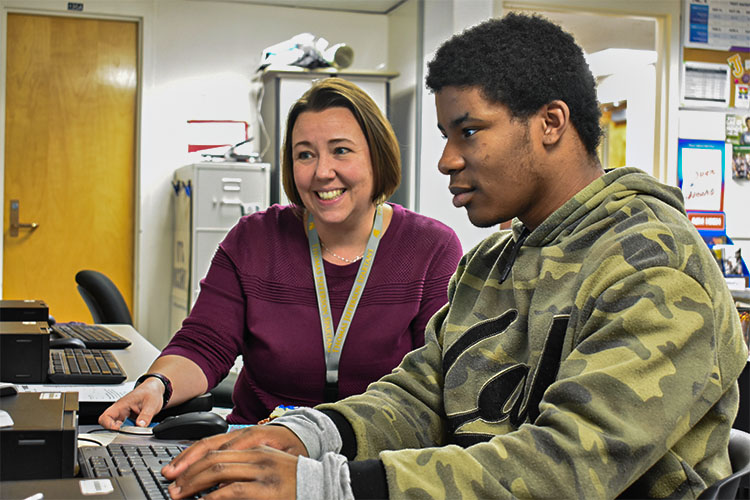
Caption: Emily Webster helps senior Ziyale Norris apply for a scholarship in Thomas Jefferson High School’s Denver Future Center. photo by Ava Ward
Thomas Jefferson High School’s new Denver Scholarship Foundation Advisor, Emily Webster, brings smarts, smiles, and support to aspiring Spartans.
The phrase ‘college admissions process’ conjures images of stern university interviewers, convoluted online applications, and crippling student debt. From FAFSA to SAT to AP, acquiring the right tools to be accepted into college can feel like sorting through an alphabet soup of bureaucratic standards and perplexing exams. Luckily, the students of Thomas Jefferson High School have a secret weapon to take down the post-secondary beast: Emily Webster.
“I’m really passionate about supporting students on their journey to life after high school,” Webster enthused. Before coming to TJ, Webster established a post-secondary success program for a non-profit organization where she supported juniors, seniors, and college freshmen through their academic transition. She was attracted to TJ because of its reputation for camaraderie and student support. “I have heard nothing but positive feedback about the TJ community,” she remarked. So far, Webster has not been disappointed. “My favorite part of working in the Future Center thus far has been getting to meet the students,” she asserted. Getting to celebrate the scholarships and acceptances students garner is what keeps Webster coming back for more. When asked what the most challenging part of her job has been, Webster was at a loss for words. “Everything has been going very smoothly. Everybody is working hard,” extolled Webster.
When she is not camping, gardening, or watching college football, Webster can be found hunting down scholarships, programs, and other academic opportunities for her students. She researches opportunities for students of all grade levels. Webster noted, “Accessing college starts when you are a freshman. The good habits you build are really important.” There is no doubt that the Future Center’s support is needed. According to a multi-year college and career readiness survey conducted by the non-profit YouthTruth, over 50 percent of students surveyed did not feel prepared for college. Webster’s work will help TJ defy this statistic, ensuring that every student is empowered with the knowledge they need to achieve post-secondary success.
Without resources like those at the Future Center, applying to college can feel like playing a high-stakes card game without knowing any of the rules. “I’m being completely honest; without the future center, I don’t think I would know about any of this—scholarships or even how to apply to certain scholarships,” admitted Ziyale Norris, a senior who applied for a scholarship in the Future Center. “I was planning to come in, but knowing myself, I probably wouldn’t have. Then, I got one of these slips telling me to come in and I did.” The Future Center’s pass system allows students to be summoned to the center during class time without fear of being marked truant. “If students get a pass asking them to come to the future center, they should definitely follow through and come visit,” urged Webster. Norris estimates that most students don’t realize that they have a treasure trove of post-secondary information just a few feet across from the attendance desk. “It’s more useful than we think,” insisted Norris. “[Webster] helps us navigate really well.”
In the Future Center, Spartans can receive something just as valuable as any monetary scholarship: empathy. “It really is a whole new process; accessing college and career options and trade schools is really different from showing up to high school and having a schedule already built for you,” acknowledged Webster. “It is really important to provide that support to make sure students can access whatever opportunities they are interested in.”
Though Webster is devoted to her craft, getting into college is a two-way street. To get the most out of the future center, Webster points out, students may have to actually enter the room. “I would encourage students to come in before they are seniors to check out the resources that are available,” Webster proposed. In the entrance of the future center, students can find grade-specific check-lists for college readiness. Even if they are unsure as to whether they would like to pursue a college education after high school, Spartans can take one of Webster’s interest profilers to determine which post-secondary path is best for them. “Setting personal goals and deadlines about getting tasks done is important,” Webster emphasized.
Planning for the future is daunting, but by taking each part of the process and breaking it down into small steps, the postsecondary journey can feel less like a breakneck rollercoaster and more like a calm walk through the park. According to Webster, the biggest mistake students make in the college admissions process is leaving everything until the last minute. “Come in and introduce yourself,” she invited. The Future Center can be found in room 135, directly across from the attendance desk. Both ambitious and ambivalent students should visit Ms. Webster today and take control of their destinies.